To get a glimpse of Thailand’s dark side and its Third World injustice system, no daytrip is more illuminating than a Bangkok prison visit, writes Jim Algie.
Opening the back door of a pink taxi, I told the driver in Thai that I wanted to go to Klong Prem Prison. I had to repeat it two more times, until his uncertainty made way for a quizzical smile.
We had only driven about 30 or 40 meters before he asked me why was I going to the prison?
To visit a friend.
When you’re a foreigner in Thailand, provided you can speak enough Thai to keep the conversation going and remain polite, you sometimes find yourself hearing stories that Thais would not repeat to their friends, and certainly not to any local customers in the backseat of their taxis.
As it turned out, the driver had once been sentenced to fifty years in prison. Why?
“For murdering my… you know por liang?”
“Ahh yes, you mean stepfather.”
“Yes, stepfather”. He couldn’t quite get his mouth around the the sound so repeated the word a few times in English… “step fodder” … “step fodder.”
The conversation stammered to a halt several times, as the driver tried to throw in some of his limited English, or because I couldn’t understand some of his legal expressions for “royal pardon,” and he had to grapple with them in tongue-tied English.
Those conversations are like the traffic in Bangkok that we found ourselves trapped in. Sometimes, for streets and streets, we flowed along in fourth gear. Then, for minutes on end, we sat there not moving a millimeter, with nothing to look at except blue ghosts of exhaust smoke, figurines of monks glued to his dashboard for mystical insurance and the occasional kid passing by selling jasmine garlands to hang on rearview mirrors as a Buddhist homage.
The cab driver’s story was that his stepfather had been getting drunk and beating up his mother night after night. He couldn’t take it anymore. So he waited until he came home drunk one night, teetering in the half-lit kitchen doorway, and shot him dead.
By the time we met he’d been out of jail for five years, but he did not regret shooting him. His stepfather was a bad man; he had it coming.
I saw him smile in the rearview mirror.
I threw in that Thai expression for “deserving it.” He nodded and smiled.
In between his remembrances of prison, and how the provincial jail in Korat was much bigger and cleaner than Klong Prem, I told him that my old friend had gotten 25 years for supposedly killing his Thai business partner.
He told me not to worry. Once again I had to admire that steadfast Thai optimism in the most horrible of circumstances. It’s one of the reasons Warren Fellows wrote in his Bangkok prison memoir The Damage Done that, aside from their ability to meditate and their undying beliefs in Buddhism and the spirit world, Thai inmates do not tend to crack up like many Westerners do.
The driver said that his 50-year sentence had been halved by a royal pardon. He also got another sentence reduction – I missed those details – and he was out in seven years.
He kept insisting that my friend would probably have similar luck when the next round of royal pardons came up.
Climbing out of the taxi, exchanging “good lucks” in Thai and grins, I thought this guy was the nicest killer I’d ever met.
Next to the friend I was going to visit that is.
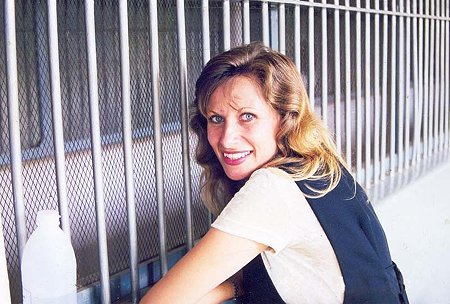
Author Susan Aldous during a Bangkok prison visit.
THE KLONG PREM PRISON PICNIC
Once a year, the authorities at one of Bangkok’s biggest and roughest prisons put on a series of family days for the inmates. On these days, families are allowed to visit their loved ones in jail for two hours at a time.
By comparison, the usual visiting time is once a week for 20 minutes, and those visits are conducted by telephone through plexiglass windows in concrete walls.
Family days are the only chance that the prisoners have to make physical contact with their spouses, children, parents and siblings. Even so, the encounters were surprisingly subdued on this day in March 2014. I saw little intimacy and few hugs. The Thai reluctance to show emotion in public places was in full force.
Under the blue awnings of Pepsi-branded tents, we sat on blue plastic chairs surrounding blue tables in the courtyard of the prison. A band of inmates played traditional Thai songs with trebly melodies and atonal vocals. All around us were food stalls, serving up sweet green curry, grilled chicken and other Thai specialties. The ice cream vendors were especially popular with the inmates, because if they wanted to have a guard bring them in a single ice cream cone, the going rate is 1,000 baht (US$33)
Corruption in the jail was one of the subjects we discussed most often with the man I will simply call “the prisoner.” Since he has one final appeal to the Supreme Court left it would not be fair to mention any details about his case.
The prisoner said that it costs 60,000 baht to get a mobile phone in jail and it’s half that for an MP3 Player. Every few months the guards raid the cells, take back the electronic devices to resell and then send those caught with them to a few months in solitary.
Every kind of drug imaginable is on sale in the jail, but if you want to send a book to an inmate you have to first send it to their embassy with their name on it and the number of the building they’re in. Then the book must be signed off by 14 different people as it moves through the prison bureaucracy. Even then, after three or four months, it may never reach the prisoner, because one of the guards has stolen and resold it. (None of the 15 books I tried to send him made it past the red tape.)
No attempt to rehabilitate the inmates are made. There are only a few correspondence courses, not much gym equipment, and no real classes. This is punishment pure and simple. It’s a point reiterated in books like The Angel of Bang Kwang by Susan Aldous and Escape: The True Story of the Only Westerner to Ever Break Out of the Bangkok Hilton by David McMillan. (The latter author, a convicted drug trafficker and serial offender, made a daring and ingenious escape from Klong Prem in 1996.)
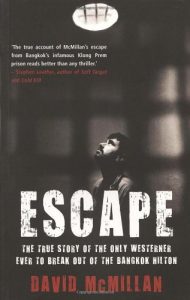
McMillian is the only Westerner to ever escape from this jail.
The only thing you learn in a Thai jail is how to become a better criminal and how to exploit weaker links on the food chain.
The petty criminals, those without outside help or inside protection, end up doing laundry for 300 baht a month, or they have to spend hours queuing up every day for canned tuna and packaged soup, for toothpaste and soap, which are only available at different times of day from the prison store.
The prisoner said, “I’m in here with killers, rapists, kidnappers, drug dealers, pedos. These are folks with low IQs. I have two famous farang thugs in my cell, and we’re locked down in this tiny cell from 2.30 in the afternoon until seven in the morning. There’s people playing drums, screaming, constant noise. I’m going mental in here.”
I don’t think he was exaggerating the squalor or the sanity-challenging conditions. At one point in the conversation, he said, “Write me a letter or, after I get out, I’ll come and kill you.”
His gallows laughter gave me the creeps. If you weren’t a criminal or a killer before you got in there – and my old buddy claims he is neither – then you will be after a few years in that clangorous madhouse.
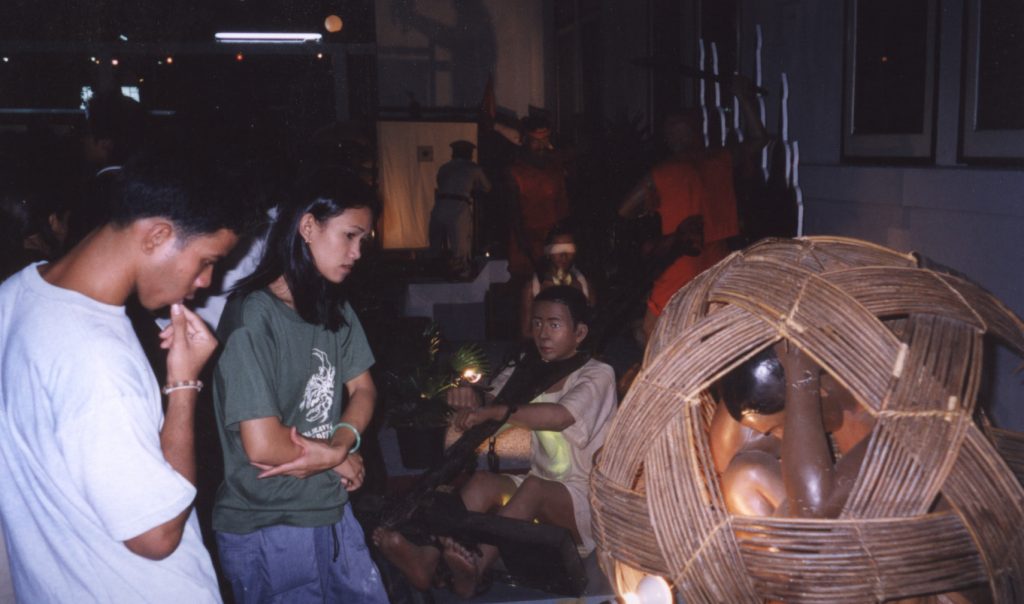
Guards put misbehaving prisoners inside these rattan balls, covered with spikes, and then let elephants kick them around, in a torture outlawed in the 19th century.
BANG KWANG’S BIZARRE BIRTHDAY PARTY
After 15 years of crime reporting in Thailand, I’ve seen some strange shit in Thai jails, but the strangest scenario had to be the 72nd anniversary of Bang Kwang Central Prison in 2002.
Best known as the biggest maximum-security prison in the country, housing some 7,000 inmates, Bang Kwang also has a death-row with around 300 lost souls who wear shackles 24/ against the
As I described the party – yes, party – in my non-fiction collection, Bizarre Thailand: Tales of Crime, Sex and Black Magic (Marshall Cavendish, 2010): “The Corrections Department set up a stage across from Bang Kwang for Thai bands, retinues of sexy female dancers, comedians and beauty pageant contestants. Commenting on the festivities, Pittaya Sanghanakin, the prison’s former director said, “The people around here have supported us, so we wanted to do something in return for them.” Up and down the roads near the jail, scarecrows wearing the prison’s blue uniform, straw hats and happy faces had been tied to power poles. “Since the inmates are not allowed out of their cells,” Pittaya said, “we thought that they could enjoy the festivities through these effigies.” Come again?
For many of the foreign inmates watching the events unfold on closed-circuit television, the celebration was a kind of torture. One of them, who asked to remain anonymous, said, “What’s there to celebrate? 72 years of injustice?”
For many of the locals visiting the two-day party, the biggest lure was the display of archaic torture instruments, complete with life-size mannequins, on loan from the Corrections Museum. These included the original machine-gun used at Bang Kwang, a tableau of two machete-wielding executioners dressed in red outfits about to lop the head off a blindfolded prisoner, and a mannequin whose arms and legs were locked in a pillory, so splinters could be hammered under the nails of his hands and feet. Watching families, beauty queens and rich matriarchs walking their poodles past these exhibits was a crash course in the country’s bizarre contrasts.”
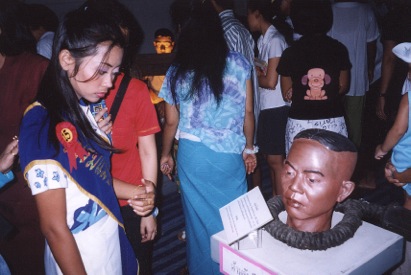
One of the contestants at the beauty pageant
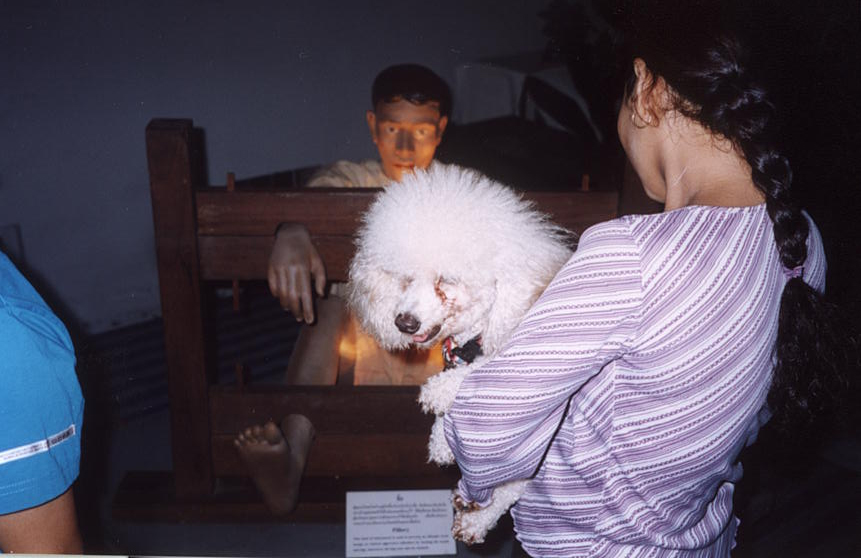
Display of torture instruments once used in Thai jails.

Front gates of Thailand’s biggest maximum security jail and largest death row where your Bangkok prison visit begins.
BANGKOK PRISON VISIT
Visiting an inmate used to be a rite of passage for many backpackers staying around Khaosan Road. Up until six or seven years ago, philanthropists, friends and family members would put up flyers on the bulletin boards in guesthouses, encouraging travelers to go and visit a certain prisoner. It’s more difficult now, but it’s not impossible.
I still think of a Bangkok prison visit as one of the best and most memorable things you can do in the country. Forget all the propaganda about “Amazing Thailand” and the “Land of Smiles” and all the fluffy books on traditional Thai arts and cultural quirks.
In the prisons you see the harsh truth. This is a medieval country with a superstitious soul and a merciless Third World injustice system, where you may get ten years in jail for using a fake credit card, or you may be out in two for raping and murdering a baby girl. Hell, you can kill half a dozen people in a car accident, like that young hi-so bitch did a few years ago, and never even spend a minute behind bars.
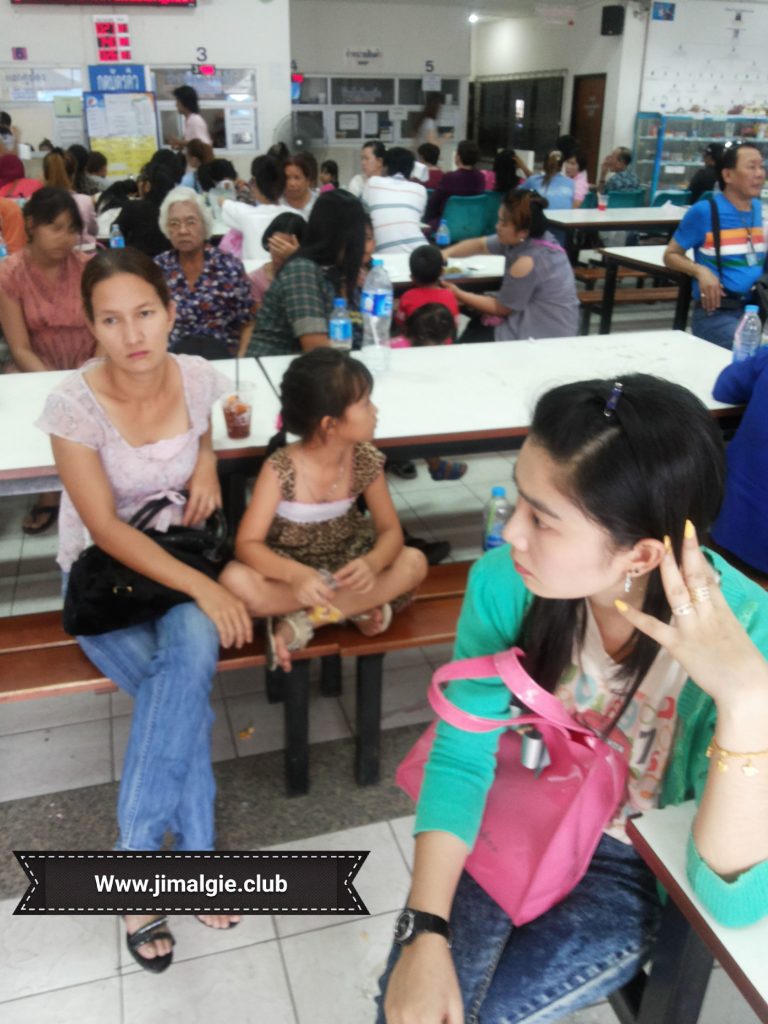
Women and families wait to see their incarcerated husbands, fathers and brothers, for a Bangkok prison visit.
A Bangkok prison visit also gives you ample insights into the bureaucratic system of patronage that still dominates every sector of Thai society. At every turn are lackeys and functionaries with no real purpose except extorting money in any way they can. Every single guard and official here is corrupt, said the prisoner. Every single one is doing under-the-table deals.
From the minute you walk into the office at Khlong Prem to see visitors waiting around at what look like picnic tables, you are faced with rule after rule after rule – at the “Service Center” where you have to register and show your passport or ID card, at the line up for food coupons, at the lockers where you deposit all your goods, at the metal detectors, at the front of the prison gates where you have to take off your shoes so another guard can inspect them.
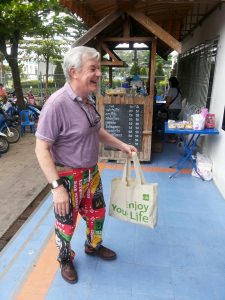
The born-again backpacker with the rented Bob Marley trousers during his Bangkok prison visit
Visitors in shorts don’t even pass the dress code and have to rent out trousers, like this poor old guy did, laughing about how he looked like a born-again backpacker from Khaosan in his Bob Marley pants.
At least as far back as William Shakespeare – “Denmark is my prison,” saith Hamlet – writers and thinkers have used jail as a microcosm of societies. But it’s true. Prisons do put these cultures into perspective.
Far from its free-spirited image, this is a land of the most conservative rule-makers who hold sway over every aspect of Thai social, cultural, spiritual and familial life. They are merciless in their conformity. A former female Thai colleague of mine could not believe how repressive the country was after returning from her university studies in the US. Her old friends complained that she was too loud, too opinionated and she danced too wildly. For her Thailand became a different kind of prison.
On this outing to the “Klong Prem Family Picnic,” I tried to buoy up the prisoner’s sinking spirits by telling him what the cabbie had said about the next round of royal pardons to be doled out towards the end of 2015.
At the moment, however, he’s more worried about his last ditch appeal to the Supreme Court. Of all the hundreds of cases he’s heard about in jail, only three or four have been quashed. The most he’s hoping for is a sentence reduction.
As I looked around at the courtyard, with hundreds of families sitting at blue tables on blue plastic chairs, I noticed that the walls were painted with murals of the royal barge ceremonies, featuring oarsmen rowing boats down an ancient River of Kings in vessels with figureheads of the Serpent King of Buddhist lore and the Hindu god Vishnu, to deliver new robes to Buddhist monks. It’s a ritual borrowed from the Khmers of Angkorean vintage, circa 10 AD. Ironically, much of Angkor was built by slave labor and prisoners-of-war.
Is this the ancient face of the country, and Thai righteousness, that they want to show to visitors?
Like most other aspects of Klong Prem, the Pepsi tents, the fountain, and the cartoon figures beside the main gates inside the jail that you see when exiting and which say “Thank You” in Thai and English, the overall effect attempts to make light, in a very Thai way, of a dungeon-dark place.
The best thing about visiting a Thai prison is getting to leave. The atmosphere in there is so grim and oppressive it’s as if gravity has tripled in weight. This is not hell so much as purgatory, a limbo devoid of activities, a waiting room in a squalid hospital where you await the doctor’s verdict of a potentially terminal illness.
Even after a 30-minute Bangkok prison visit you will never feel quite so happy to walk down a cracked sidewalk at your own pace, deciding whether you’d like an ice cream from a convenience store or a bowl of noodles from a street-side shop. Even the pollution and car exhaust smell sweeter than the rancid desperation that clings to every molecule of air in these hellholes.
(2023 update: The prisoner’s case was rejected by the Supreme Court. He never received a royal pardon either. In 2022, he died of leukemia in this jail.)
For more stories of prison life in Thailand see Jim Algie’s author’s page at Amazon.
The expanded version of Jim Algie’s latest book, “On the Night Joey Ramone Died: Tales of rock and punk from Bangkok, New York, Cambodia and Norway” contains a 130-page non-fiction of “Rock Writings and Musical Memoirs,” including “My Close Encounters with Rock Stars,” featuring Joe Strummer, the Pixies, Ice-T, Pearl Jam, Soundgarden, Jim Carroll and Leonard Cohen, while “My Last Gig and Worst Onstage Disaster” chronicles a near-death experience he had in Berlin. The new paperback is available from Amazon for US$12.99 and in an ebook format for US$2.99.
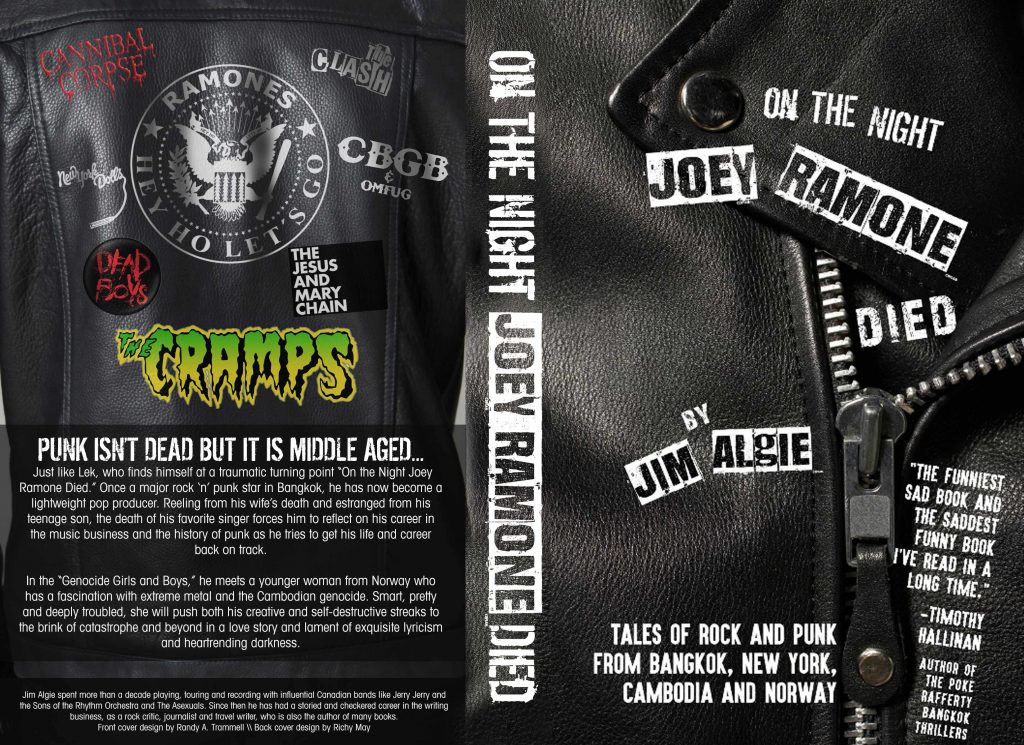

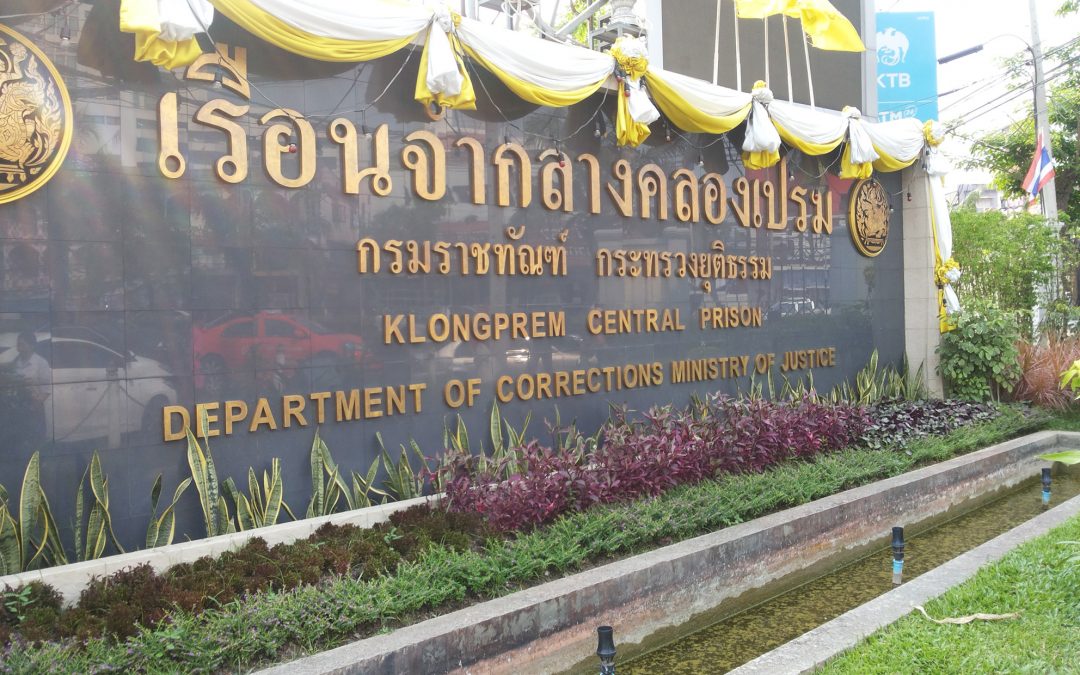
Hi, I’m looking for more information about visiting a Bangkok prison but I can’t find any websites that are still active or that contain more up to date info. I’d really appreciate your help!
Cheers, Charlotte
I have sent you an email, Charlotte.
Hi
I’m currently in Bangkok and hoping for a visit
Any help from you would be greatly appreciated
Thank you
Hi, I found your prison visit article very interesting.I’ve wanted to visit a prison for a while now to offer my support. Very little information is available on the net. I live in Bangkok. Any info would be most appreciated. Thank you.
Hi Ann I used to visit a prisoner in Bang kwang Central prison years ago he was from the uk an is now a free man back in the uk with a family of his own..I used to Arrive at the prison on the day he was allowed visitors and used to say I was his cousin on the forms I had to fill in and then had to wait inside the waiting room on him coming to see me he once told me he has plenty of cousins who come to visit him he never did tell me his crimes I already done research on him beforehand he also used to say nothing bad about the conditions of which he was living in …
Aswome read, I will be buying this book. I live in northeast thailand and have done for 5 years, I worry so much about jail time here, even an traffic accident could have you tucked away. Again good read and thanks
bonjour
Ann Turvey / pour les visite de prison a Bangkok , il ya Klong prem et remand prison qui sont cote a cote . il suffit de se présenter avec son passeport et le nom du détenu ( pour klong prem 6 building. il y a des jour pour chaque.
A good insight into the most famous Hilton.
I am in bangkok next week for a few days and looking to visit a western prisoner.
Can you help.
Excellent moody read. The optimism you mention appears also to be reflected in the common thai habit of spending money as soon as it arrives because tomorrow should bring more. Hence, I guess, it has the highest per capita borrowing rate in the world as far as I know. I was once involved in prisoner rehabilitation in England. It involved spending a week inside what are now known as youth offender prisons but were then called borstal (there is a very realistic film of that name). In more ways than some there were similarities born of the nature of confined humans. My naive and limited experience was mental hell. And also physical he’ll for a colleague.
Thanks for taking the time to read the piece and commenting, Mark.
Is it possible to get a list of English speaking prisoners who receive the least number of visits? In other words when I go I’d like to visit someone who needs it most.
Not that I know of, but you could try contacting the different embassies. They would know.
Jesus, Jim. this is an extraordinary piece. It should be required readng for any idiot who goes to Thailand thinking it’s the Land of Getting Away With Everything. Thank you very much.
This is the best article about Thai prisons I have come across.
To the point.
Another bulls eye from you Jim.
rgds
Kai
Hi
I’m in Bangkok later this month and hoping to visit someone . any help would be much appreciated. Thank you
From what I understand it’s become much more difficult to visit prisoners there unless your family. By all means go to the prisons and ask.